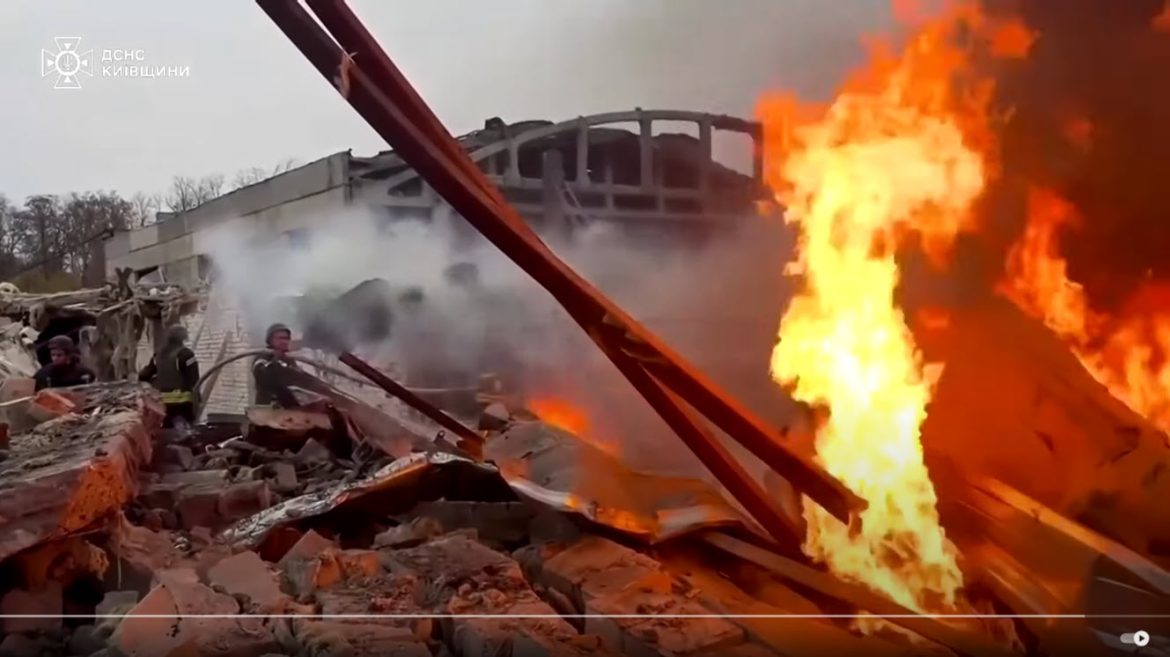Russia has launched its first missile attack on Kyiv since August, a development that alarms Ukrainian officials and civilians as winter approaches. Early reports from Ukraine’s military confirm that air defenses intercepted the majority of the missiles, averting significant damage to critical infrastructure in the capital city. However, the assault underscores the ongoing risk of disruption to the nation’s energy grid, heightening fears of prolonged blackouts and power shortages as colder months set in.
Ukrainian authorities report that Russia’s latest offensive utilized long-range missiles, with sirens blaring across Kyiv and surrounding regions as citizens sought refuge in underground shelters. The timing of this attack has escalated concerns about the resilience of Ukraine’s energy network, a frequent target in Russia’s war strategy over the past year. With freezing temperatures expected soon, maintaining stable electricity and heating is essential to avoid a humanitarian crisis.
Andriy Yermak, head of Ukraine’s Presidential Office, called the missile strikes a “brutal escalation” intended to “freeze and terrorize Ukrainians into submission.” He noted that the attack’s immediate objective appeared to be psychological and disruptive, seeking to rattle civilians rather than achieve strategic military objectives. “They are trying to leave us in the cold and dark,” Yermak said in a statement, urging resilience among citizens.
Ukraine’s national energy provider, Ukrenergo, has begun coordinating efforts to ensure that recent attacks do not severely compromise the power grid. In recent months, Ukrenergo and utility companies have installed new defenses around critical energy hubs and power plants, anticipating renewed assaults. Emergency repair teams are on standby across Kyiv, while portable generators and emergency heating stations are being deployed as a precaution.
In addition to the immediate impact on Kyiv, Ukrainian military officials say that missile strikes targeted several other areas, including the northeastern city of Kharkiv and towns near the southern port city of Odesa. Local officials report a partial loss of power in these areas but assure residents that restoration efforts are underway.
Volodymyr Zelenskyy, Ukraine’s president, condemned Russia’s renewed missile attacks, labeling them a “deliberate effort to deprive Ukrainians of basic necessities.” He reiterated that these acts would only strengthen Ukraine’s resolve and solidarity among its international allies. Zelenskyy also called on Western nations to expedite support, particularly air defense systems, to help shield Ukraine’s energy grid and civilian infrastructure from future strikes. “We need stronger air defenses, and we need them now,” he urged in a statement directed toward NATO allies.
In response, NATO Secretary-General Jens Stoltenberg reaffirmed the alliance’s commitment to supporting Ukraine, saying, “Russia’s indiscriminate attacks on civilians are reprehensible and underscore the need for continued assistance to Ukraine.” The U.S. and European allies have already pledged additional air defense systems, and recent shipments include advanced systems capable of intercepting high-altitude missiles.
Russia’s Ministry of Defense has not provided specific comments on the recent missile strikes. However, Kremlin spokesperson Dmitry Peskov has previously defended attacks on Ukraine’s energy infrastructure as legitimate military targets, a claim widely disputed by the international community. This strike is seen by military analysts as part of Russia’s strategy to drain Ukrainian resources and morale by targeting critical services. “It’s a war of attrition, and winter is Russia’s latest weapon,” says defense analyst Nicholas Leffler, highlighting the logistical toll that power disruptions impose on civilians and the military alike.
Meanwhile, Kyiv residents remain on high alert, with authorities urging preparedness for possible prolonged blackouts. Emergency supplies, including blankets, flashlights, and non-perishable food items, are in high demand as families brace for potential hardships. Schools and workplaces have been urged to implement contingency plans, and city officials are expanding community warming centers to accommodate any surge in demand.
Despite the challenges, Ukrainian officials maintain a tone of resilience. “We will not be brought to our knees,” Kyiv Mayor Vitali Klitschko declared, echoing a sentiment of defiance that has become a hallmark of the city’s response to the Russian invasion. “Our defenses are strong, our people are stronger, and we will endure, no matter the hardships.”
The situation remains tense as Ukrainians brace for the possibility of more attacks in the coming days. The international community continues to monitor the situation closely, with humanitarian organizations preparing to mobilize additional support if winter-related hardships worsen. For now, Kyiv stands resilient but vigilant, as the possibility of more strikes looms over the city and its people.



